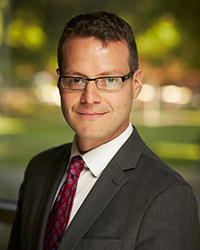Here's to Your Health
COVID-19 pandemic intensifies real-life learning for health-minded UNLV students

By Elizabeth Rusiecki
When a once-in-a-lifetime pandemic struck, the UNLV William S. Boyd School of Law’s Health Law Program turned the multifaceted global crisis into a teaching moment.
A partnership of the university’s law and public health schools—and directed by Dr. David Orentlicher—the Health Law Program made COVID-19 the headliner for its annual health law conference in April. About 80 students, community members, and policy makers gathered via Zoom to discuss how federal, state, and local authorities can balance the scientific and political aspects of pandemic decisions and the underlying tensions connecting them.
Also, Maxim Gakh—a professor in UNLV’s School of Public Health and the associate director of the UNLV Health Law Program who also teaches at the law school—gave COVID-19 a front-row seat in his Public Health Law and Public Health Policy courses.
Conference Mobilizes Minds
Since 2018, the health law conference has focused on a timely health-specific policy issue—for instance, the opioid epidemic, health cost containment, and healthcare reform in the 2020 election—to promote understanding. Another important goal of the conference, Orentlicher says, is to help policy makers recognize that the state’s sole law school is a resource for nonpartisan, objective information based on the best understanding from a scientific and legal perspective.
Orentlicher, the Judge Jack and Lulu Lehman Professor of Law at UNLV Boyd, is a policy maker himself, serving as freshman Assemblyman in the 2021 Nevada Legislature.
April’s conference studied COVID-19 from three legal perspectives:
• The vaccination approval process and emergency authorization usage
• Public health mandates (such as masks), as well as capacity limitations, social distancing, and immunization requirements
• Allocation issues resulting from vital health-related shortages, such as ICU space, ventilators, medical equipment, and vaccines, and the difficult triage decisions that accompany those shortages
Benjamin Franklin once said, “An ounce of prevention is worth a pound of cure.” And in that respect, the last decade has seen an increase in public health preparedness because of severe acute respiratory syndrome (SARS) in 2003 and the H1N1 (swine) flu in 2009. However, as Orentlicher notes, the nation’s health care systems are still structured so that far more money is spent on treatment than prevention.
He’s hopeful that the global effects of COVID-19 will change that mindset—not to mention open more opportunities for health law careers.
“This [pandemic] is going to force us to do more,” says Orentlicher, who served as a health policy adviser for the presidential campaigns of Barack Obama and Joe Biden. “The field is definitely growing, and when I think of the space of health care law, it’s become more important than it was 20 years ago. That’s been good to see.”
For students interested in health law, the law school and Health Law Program offer several faculty members who have expertise in different aspects of the field, including: Gakh (public health), UNLV Boyd Law Interim Dean Sara Gordon (mental health), professor Leslie Griffin (bioethics), professor Ann McGinley (disability discrimination), and adjunct professors Glen Stevens (managed care) and Susan Pitz (fraud and abuse).
“Quality of care, malpractice liability, ethics, compliance, health care delivery, insurance, public health—this is a highly regulated field, so for our graduates who master these complicated regulations, there’s a lot of demand for their expertise,” Orentlicher says. “That’s one of the nice things about health care law: There are many different directions you can go.”
COVID-19 Seeps Into the Classroom
With COVID-19 transforming lives, Gakh made it a focus of his cross-listed Public Health Law and Public Health Policy courses, which are available to UNLV Boyd Law as well as master’s and Ph.D. public health students.
In Public Health Law, the class focused on the current pandemic as context when discussing how law is used to prepare for and respond to public health emergencies and when delving into the government’s authority to establish and implement effective mitigation measures that also respect individual rights.
The pandemic last year really reified many of the issues I’ve been teaching for several years,” Gakh says. “There was an increased interest in understanding the role of law and policy in shaping and responding to this pandemic.”
Gakh says the dynamic of having both UNLV Boyd Law and School of Public Health students taking the same course brought fresh eyes to the pandemic and enhanced the legal conversations around such crossover topics as bans on large gatherings, school closures, and vaccinations.
“All the students had very specific experiences they could draw on just as human beings living through this thing,” Gakh says. “Trying to think about how the dots connect and how everything associated with the pandemic impacted their personal lives was really interesting to hear and led to some great conversations.
“Understanding the context—whether practicing health law or something else—helps students think about how the pieces fit together and helps them understand the impact of law.”
In addition to Public Health Law, Gakh teaches a Public Health Policy course, which is also cross-listed at both schools. Last year, students in this class collaboratively completed a policy analysis that examined possible policy levers to increase uptake in Nevada, even partnering with the Nevada Public Health Association to “think through” possible alternatives.
“Nevada and Las Vegas need attorneys who come at problems with both legal tools and broader context,” Gakh says. “I’m hoping Boyd students will become lawyers who bring all of those perspectives and skills to real-world problems affecting the community.”